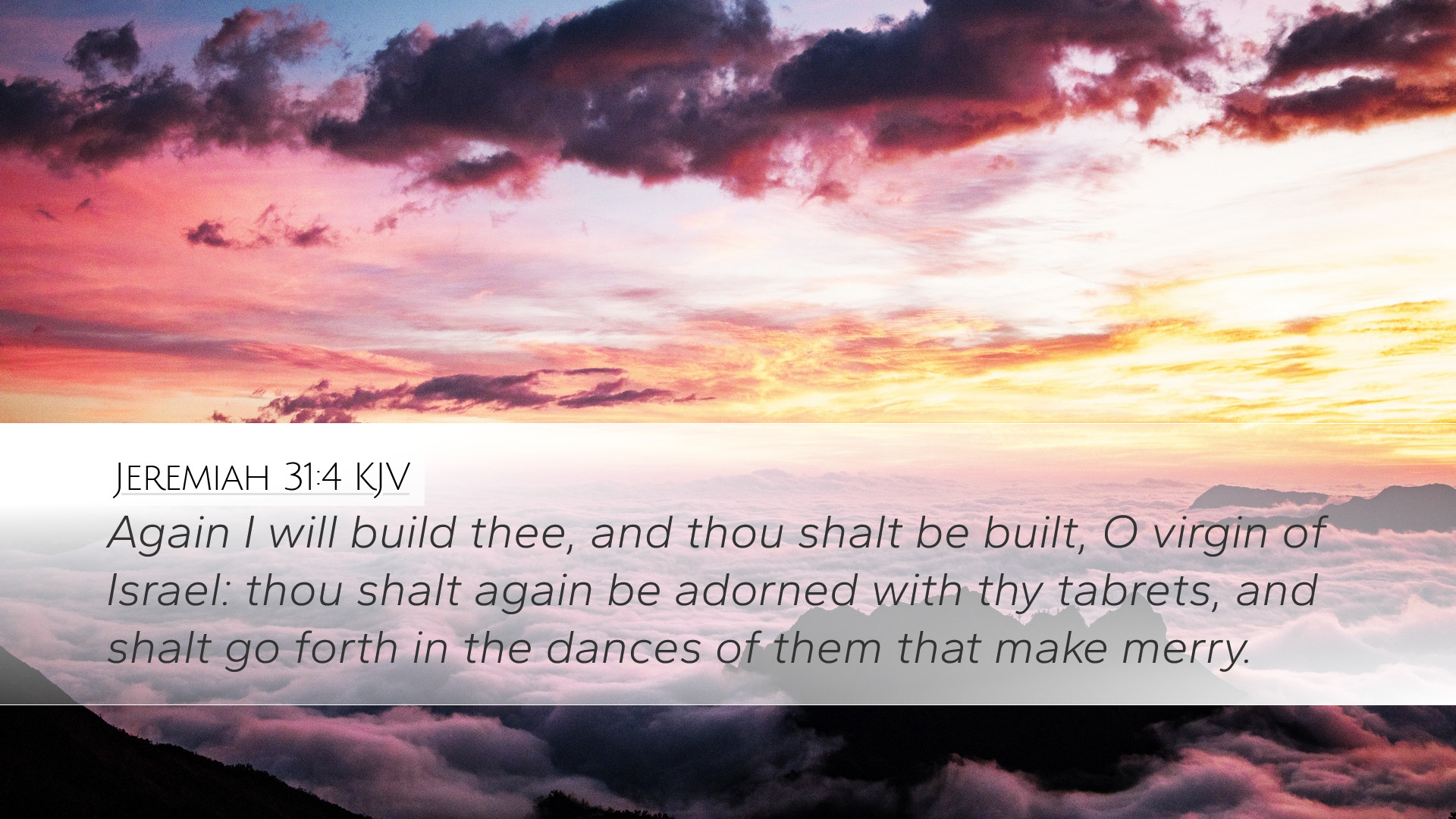Commentary on Jeremiah 31:4
Verse Text: "Again will I build thee, and thou shalt be built, O virgin of Israel: thou shalt again be adorned with thy tabrets, and shalt go forth in the dances of them that make merry." (Jeremiah 31:4)
Introduction
The prophetic words of Jeremiah 31:4 encapsulate a profound message of hope and restoration. This verse appears in a section of Jeremiah often referred to as the "Book of Consolation." It addresses the deep sorrow of Israel, promising a future of restoration and joy. The imagery and insights derived from this verse are layered and resonate deeply with the theological themes of renewal and divine grace.
Historical Context
The time of Jeremiah was marked by impending judgment as the nation of Judah faced the consequences of its persistent disobedience to God. The Babylonian exile loomed, and the people felt an overwhelming sense of despair. In this context, Jeremiah’s prophecy serves as a beacon of hope, assuring the Israelites of God’s promises beyond their current suffering.
Thematic Insights
This verse can be broken down into several key themes that are crucial for understanding its implications:
- Divine Restoration: The phrase "Again will I build thee" emphasizes God's commitment to restore His people.
- The Virgin of Israel: This title signifies Israel's status of purity and uniqueness among the nations, implying a return to her former glory.
- Joyful Celebration: The imagery of adornment and dancing reflects the joy and celebration associated with God's restoration.
Detailed Commentary
Divine Commitment to Restoration
Matthew Henry emphasizes God’s unwavering promise to restore Israel, indicating that despite their backsliding, His grace would prevail. Henry states that the divine overture to "build" signifies not just a physical reconstruction but a spiritual renewal. This restoration is an act of grace, reminding believers that God’s love is steadfast and transformative.
The Significance of 'O Virgin of Israel'
Albert Barnes draws attention to the term "virgin." In the context of ancient Israel, this indicates a young woman, often associated with purity and potential. Barnes interprets this as a metaphor for the restored relationship between God and Israel. In their state of exile and sin, Israel lost their identity, but the promise of restoration heralds a return to purity and commitment to God’s covenant.
The Imagery of Music and Dance
Adam Clarke highlights the cultural significance of music and dance in Israelite worship. The mention of "tabrets" (tambourines) symbolizes celebration and joy. In a time of deep mourning, Clarke notes that God promises a return to communal worship, where the people will celebrate their renewed covenant with Him. Worship, often expressed through dance and music, signifies the restoration of joy in God's presence.
Theological Reflections
The theological implications of Jeremiah 31:4 extend into various domains of scholarship and pastoral ministry:
- Promise of Restoration: This verse can serve as a reminder of God’s unyielding grace. It reassures believers that no matter how far they stray, God’s readiness to restore is ever-present.
- Identity in Christ: For New Testament believers, the idea of divine restoration is fulfilled in Christ. Just as Israel was promised restoration, Christians are called to recognize their identity as a new creation.
- Worship and Joy: The link between restoration and joyful worship is significant. It articulates that a restored relationship with God will naturally lead to an expression of joy, culminating in communal worship experiences.
Application for Today
In pastoral care, the message of Jeremiah 31:4 can provide hope to congregants facing despair or distress. It is crucial for theology teachers and leaders to share this message of restoration as an integral part of discipleship.
- Encouragement for the Struggling: Pastors and counselors can use this verse to encourage individuals to embrace the hope of restoration and the joy that follows.
- Communal Worship Practices: Churches can foster environments where joy is celebrated through worship, reflecting the promise of God’s restoration.
- Identity and Purpose: Believers must be reminded of their identity in Christ and the calling to live out a life of restoration and grace in their communities.
Conclusion
Jeremiah 31:4 serves as a timeless reminder of God's promise of restoration. The insights drawn from public domain commentaries reveal the richness of this verse, encouraging both individuals and communities to embrace the hope found in God's unwavering grace. As we reflect on these words, may we all be propelled towards a deeper understanding of restoration and joy in our walk with God.


